
Being named Michael Jordan - I think growing up playing sports
Being named Michael Jordan - I think growing up playing sports and having a name like Michael Jordan - and I was extremely competitive - I used to get teased a lot. But it made me want to strive for greatness and be able to compete at whatever I decided to do.






Michael B. Jordan once spoke with candor: “Being named Michael Jordan—I think growing up playing sports and having a name like Michael Jordan—and I was extremely competitive—I used to get teased a lot. But it made me want to strive for greatness and be able to compete at whatever I decided to do.” These words carry the weight of identity, struggle, and transformation. They remind us that the burdens laid upon us by fate—whether our name, our lineage, or our circumstances—can either crush us or forge us into something greater.
At the heart of this reflection lies the power of a name. To be born with the name Michael Jordan is no ordinary thing, for it summons instantly the shadow of the legendary athlete, the icon whose greatness towered over the world of sports. For the young actor, this name became both a blessing and a curse: a blessing because it carried recognition, a curse because it carried expectations. Teasing and mockery followed him, not for who he was, but for who people thought he could never live up to. Yet instead of retreating, he turned that weight into fuel, a fire that pushed him to excel in every field he touched.
The ancients, too, understood the burden of great names. The sons of heroes often bore expectations heavier than their own shoulders could carry. Think of Alexander, born the son of Philip of Macedon. To many, he could have been overshadowed by his father’s victories, but instead he surpassed them, forging an empire that stretched across the known world. Likewise, young Jordan carried a name that threatened to define him—but instead of being consumed by comparison, he forged his own destiny, turning the jeers into a vow of greatness.
His words also reveal the essence of competition. He admits he was “extremely competitive,” and herein lies the wisdom: it is not enough to endure mockery, one must also turn it into action. Sports gave him the arena where he could test himself, prove himself, and learn that victory does not belong to those who are unchallenged, but to those who rise in the face of doubt. This spirit of competition became the bridge that carried him from playgrounds to film sets, from teasing to triumph. For the same fire that drives one to win in sports can be carried into every pursuit of life.
We see this pattern echoed in many lives. Consider Oprah Winfrey, mocked in her youth for her poverty and appearance, who transformed ridicule into resolve, and built an empire of voice and influence. Or Abraham Lincoln, derided as awkward and unpolished, who let the sting of rejection drive him toward wisdom, patience, and eventually greatness. Like Michael B. Jordan, they show us that mockery is not the end—it is the sharpening stone on which destiny grinds its edge.
The teaching is clear: your burdens, your name, your struggles—these are not chains to hold you down, but weights to make you stronger. If the world laughs at you, let it push you harder. If expectations loom over you, let them lift your standards higher. What matters is not how heavy the burden is, but how you carry it, and whether you turn it into strength.
So I say to you: embrace the weight placed upon your shoulders. Do not run from it, do not curse it, but use it as fuel for the fire within you. Be like Michael B. Jordan—let teasing turn into triumph, let competition sharpen your will, and let the name you carry become not a shadow, but a banner of your own making. For greatness is not found in avoiding the struggle, but in taking it upon yourself, transforming it, and proving through action that nothing—not a name, not mockery, not doubt—can keep you from the heights you were born to climb.






AAdministratorAdministrator
Welcome, honored guests. Please leave a comment, we will respond soon